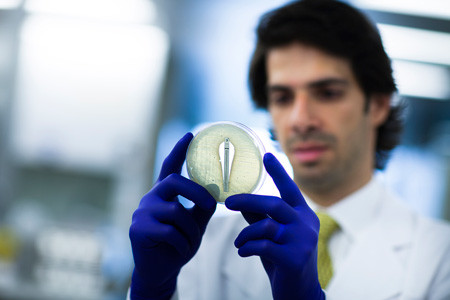Phantom Superbug in Middle East Could Spread Worldwide
Monday, 02 June, 2014

 A phantom superbug in the Middle East is cloaking itself in genetic material to avoid detection and placing the population at increased risk of deadly infections.
A phantom superbug in the Middle East is cloaking itself in genetic material to avoid detection and placing the population at increased risk of deadly infections.
University of Queensland Researchers who discovered the n antibiotic-resistant bacteria warn the hard-to-detect superbugs may quickly spread beyond the region and emerge worldwide.
Researcher Hosam Mamoon Zowawi (pictured right), from the UQ Centre for Clinical Research, said the ‘phantom’ superbugs were found during a region-wide collaborative study on superbugs in the Gulf Cooperation Council (GCC) states of Saudi Arabia, United Arab Emirates, Kuwait, Qatar, Oman and Bahrain.
“The study found antibiotic-resistant bacteria in samples from all GCC states,” Mr Zowawi said.
“Not only were the bacteria widespread, but they were found to be carrying genetic material which empowers them to resist antibiotics and avoid detection in routine laboratory testing.
“This means patients are not being treated quickly with the right antibiotics, allowing the bacteria time to spread.
“The results of this study will hopefully encourage laboratories to introduce more specific testing techniques to identify and prevent overlooking the presence of phantom superbugs.
“Implementing effective infection control precautions is also essential to minimise the spread of superbugs.
“Several clusters of the phantom superbugs were also detected in different patients from the same hospitals, suggesting patient-to-patient spread of infection is occurring,” Mr Zowawi said.
The research team is now developing new diagnostic techniques to rapidly identify antibiotic-resistant bacteria, including the phantom superbug.
“We hope this will help in advancing the surveillance of superbugs by reducing the turnaround time to identify the deadly bacteria,” Mr Zowawi said.
“It will also assist clinicians to apply targeted treatment and implement infection control precautions sooner.”
The research findings are published in this month's Antimicrobials Agents and Chemotherapy journal
Incontinence management innovations for healthcare facilities
Incontinence management is rapidly improving courtesy of new technologies and compassionate...
Remote laundries target preventable disease in NT communities
A new community laundry has launched in Borroloola, part of a program seeking to curb preventable...
Eye care partnership looks to support First Nations optometrists
A new scholarship initiative will support Aboriginal and/or Torres Strait Islander optometrists...

![[New Zealand] Transform from Security Awareness to a Security Culture: A Vital Shift for SMB Healthcare — Webinar](https://d1v1e13ebw3o15.cloudfront.net/data/89856/wfmedia_thumb/..jpg)
![[Australia] Transform from Security Awareness to a Security Culture: A Vital Shift for SMB Healthcare — Webinar](https://d1v1e13ebw3o15.cloudfront.net/data/89855/wfmedia_thumb/..jpg)




